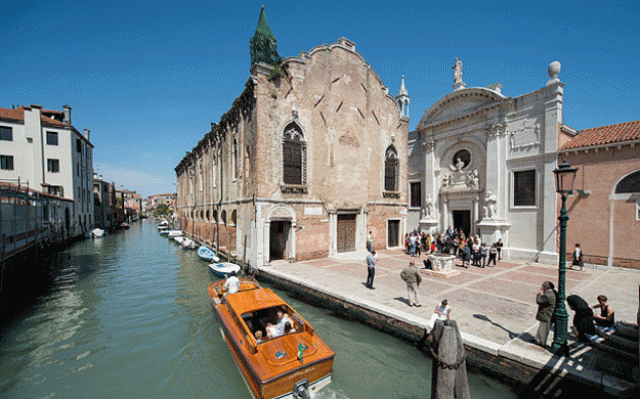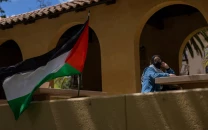Venice church transforms into mosque for seven months
“The Mosque” is designed by Swiss artist Chris Büchel for a prestigious art exhibit

The first mosque in the historic city of Venice. PHOTO: EPA
“The Mosque” is designed by Swiss artist Chris Büchel as Iceland’s entry to the art exhibition. The exhibit seeks to challenge attitudes towards Islam and will be the only mosque in the Venice city centre for duration of seven months.
There are, however, concerns about potential “public order” issues and offending “sensitivities”, according to police sources.
Read: Catholic Archbishop teaches Christians about Islam
Visitors are expected to experience a cultural clash of Baroque walls and Catholic architecture adorned with Arabic script, prayer rugs angled toward Mecca in the aisles and crucifix mosaics hiding behind soaring mihrabs.

Visitors inside the installation 'The Mosque'. PHOTO: EPA
“There are tens of thousands of Muslim tourists coming through Venice every month who wonder why there is no mosque, in a city where you can see Islamic history with your eyes,” Mohamed Amin Al Ahdab, president of the Islamic community of Venice, told the New York Times.
Venice has long stood as an independent republic; for centuries clashing and conducting trade with the Ottoman Empire, as they fought for control over the eastern Mediterranean. It eventually defeated the Turkish fleet at the Battle of Lepanto in Greece, 1571.
While Buchel’s work has come 500 years on, and the region is more tolerant towards immigrants than in other parts of Italy, it will be exhibited amid renewed tensions.
Read: Egyptian Muslims gather funds for church in Cairo
Earlier this year a proposal by Qatar to build a museum of Islamic cultural centre near Rialto Bridge was met with opposition from the right-wing Northern League party. There were suggestions that ISIS could make their way into Europe via Italy.
However, the artists behind the work believe it is essential to enable greater dialogue at a time when tensions are widespread in Europe. The exhibit itself has been commissioned by Iceland, which has one of the lowest immigration rates in the western world.

A vending machine, part of the installation. PHOTO: AFP
Björg Stefánsdóttir, director of the Icelandic Art Center and commissioner of the Icelandic pavilion, said the work was designed to “promote dialogue and communion among cultures, so much needed at home and abroad”.
Earlier this year five former mayors of Cordoba accused the Catholic church of wrongly claiming ownership of the Mezquita, the city’s Unesco-listed cathedral, as part of a continuing effort to stamp out the site’s Muslim past.
The cathedral, consecrated in the 13th century after the Moors were driven from the city, was built in the centre of a huge mosque that was once among Islam’s holiest sites.
The article originally appeared on MuslimVillage



1726734110-0/BeFunky-collage-(10)1726734110-0-208x130.webp)















COMMENTS
Comments are moderated and generally will be posted if they are on-topic and not abusive.
For more information, please see our Comments FAQ